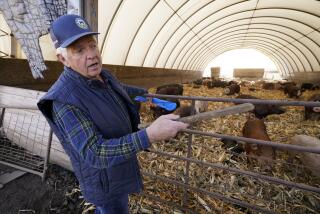OXNARD : Animal-Rights Activists Hold Protest at Plant
- Share via
Holding posters and chanting slogans, a group of 20 animal-rights activists on Monday demonstrated at Oxnard’s Procter & Gamble plant against the company’s use of animals in product testing.
During the one-hour demonstration, protesters dumped dozens of empty boxes of Procter & Gamble products in the visitors parking lot and urged a consumer ban on the company. They also stood along the sidewalk in front of the plant at 800 N. Rice Ave., waving signs at passing motorists.
Simon Oswitch, vice president of Ventura-based Animal Emancipation, said the event was successful in drawing public attention to the issue. It was the fourth protest at the plant since 1989, he said.
“I really feel we’re slowly but surely getting the message out,” he said.
The protest ended after company officials and an Oxnard police officer ordered the demonstrators to leave the property. Oswitch and others said they were disappointed that no company official would address their questions.
But Robert Paulger, a spokesman for Procter & Gamble, said company officials had not been contacted by the animal-rights activists prior to Monday’s protest.
“They’ve never really asked to have a meaningful conversation,” he said.
Paulger said no animal testing is done at the Oxnard plant, although he said the company does use animals in testing elsewhere to “ensure product safety.”
Charmin toilet paper and Bounty paper towels are manufactured at the Oxnard plant.
Paulger further stated that the company has reduced its use of animal testing by 92% since 1984. However, he could not supply specific figures or say where the testing is still being done.
Protesters on Monday demanded disclosure of the number of animals being used in tests by Procter & Gamble to back up the company’s claim of 92% reduction.
“They’re just throwing off pithy little comments,” Oswitch said. “But there’s no evidence to support that.”
Animal rights’ activists also contend the testing is done to protect the company from liability lawsuits, not to make the products safer from humans.
Paulger disputed this claim, saying, “Litigation has nothing to do with it, to my knowledge.”
More to Read
Inside the business of entertainment
The Wide Shot brings you news, analysis and insights on everything from streaming wars to production — and what it all means for the future.
You may occasionally receive promotional content from the Los Angeles Times.










